No. 8
August 2023
Parliament to Reconvene September 18
• System of Party Rule in Utter Disrepute
• Laws Passed in Last Parliamentary Session
• Bill 18, the Online News Act
• Trudeau's Reshuffled Cabinet
Ontario Education Negotiations
• Ongoing Attempts to Eliminate the Right
to Strike
in K-12 Education in Ontario
• Secondary School Teachers' Union's Proposal to Prevent Strike
• Government Forced to Negotiate New
Standardized Reading Tests
Interview with Leaders of the Marxist-Leninist Party of Quebec
• On Democracy and the Constitution
Parliament to Reconvene September 18
System of Party Rule in Utter Disrepute
On June 21 Members of
Parliament unanimously agreed to adjourn the House of Commons until
September 18. The Senate adjourned on June 22 until September 19. The Hill
Times characterized the now-adjourned House sitting as
"acrimonious and raucous." This echoed the views of numerous political
commentators who say that political discourse at the federal level has
reached an unprecedented low of personal attacks and confrontation.
Personal attacks and factional fighting are certainly par
for the course. Nonetheless, personal attacks and confrontation do not
constitute "political discourse" at all. They are symptoms of the
contention between factions which vie for political power, the use of
positions of power and privilege to impose things by fiat -- i.e.
dictate and declarations or back door deals -- and the stranglehold
over the polity of police powers and electoral machines run by
unscrupulous individuals and companies whose main role is to make
themselves very wealthy by running smear campaigns, filling the
airwaves with so-called issues which divide the polity and the like.
This makes the description of political discourse as "acrimonious and raucous" which appears to be true, a block to going to the heart of the matter of what is taking place as a result of the failure of the system of party rule to function. One of this system's primary goals has been to shore up the pretense that the people are represented by either the party in power or the parties in opposition or by "their" Members of Parliament. The institutions, arrangements and electoral process which shored up this pretense have lost all legitimacy and credibility. Today, the perception of the vast majority of the people is that they are not represented, that ministers are privileged, self-serving and devoid of a social conscience. Far from taking up social responsibility and being accountable for their words and deeds, to keep their positions they have to be yes men and women whose main feat is to be adept at representing what they are told to represent and forgetting about having any conscience whatsoever. As for the legislatures, which have always been seen as rubber-stamp bodies, today they have become disposable and are seen to be powerless themselves. Decision-making is no longer vested in the legislatures but in first ministers and, on occasion, cabinet ministers or their proxies, acting at the behest of the U.S. administration and Pentagon.
Recent polling itself indicates that the cartel parties with seats in the House of Commons are experiencing a deepening crisis of legitimacy. Frank Graves, President of EKOS Research, commented on June 26 on recent polls which he said should be placed in the context of "long-term pessimism about economic conditions, rising distrust of institutions, and disinformation." He said "I've never seen the country in a darker, more divided mood than we find it today." According to Graves, there is a rise in "affective polarization," expressions of emotional dislike or distrust, not "'I don't agree with you on issue A or B' but 'I don't like you. I don't want you to live on my street. I wouldn't want my daughter to date your kid.'"
Readers should keep in mind two things. One is that polling itself is discredited because the questions are designed to get answers which are themselves disinforming. The second is how one-sided his assessment is. The valid question is whether the polarization Graves and many others lament is between one faction and set of people and another faction and set of people or that it shows the increasingly evident split between the rulers and those they seek to rule and control? Whatever he says about "affective polarization," is because working people from coast to coast to coast are speaking out in their own names to defend the claims they are clearly entitled to make on society for their well-being to be put in first place. They do not trust what are called the liberal democratic institutions or the decision-making process which has been taken over by narrow private interests and ministers who do their bidding.
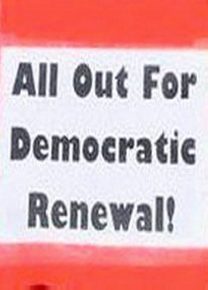
All of this reveals that the anarchy and violence which exist as a result of the neo-liberal anti-social offensive has intensified the dysfunction of the constitutional order. Anarchy has long since been raised to authority which means that the decision-making power of rulers is no longer limited by legislatures said to represent the people's decision-making power. As a result of the insatiable greed and opportunism of oligopolies which have taken control of the state and the public purse, incoherence permeates every facet of life. While it appears as if life is becoming more and more complex because the peoples can count on nothing and predict nothing, in fact Canadians can now see that things are more simple, not more complex. For instance, the belief used to prevail that elections and casting a vote elected a people's representative. This was never true but the belief prevailed. In fact, the vote is the act by which the authority to speak in one's own name is handed over to another who pledges allegiance to the Crown, to a system of rule which represents the interests of the Crown which the people have no say in fashioning. Now people can see clearly that they exercise no control over these representatives and that the system of party rule has degenerated to such an extent that even the so-called representatives have no say over anything within their own parties, let alone in government.
 The conditions
are lifting the veil off of the perception that the people elect their
own representatives. They do not consider that those who rule are an
integral part of the society but, on the contrary, see them as existing
above it, taking decisions outside of the legislatures and, moreso,
outside of the country altogether. Canadians can see for themselves
that they are not equal members of the polity but disposable. Equality
is not a social relation which the likes of Trudeau can shuffle about
and call it gender equality or representation of minorities. Equality
is a structure and that structure must be replaced with one conceived
of by the people themselves who, by so doing, will even define what
constitutes "the people." Members of society are not "born equal" but
through their participation in a political process which is empowering,
they are able to take the decisions which affect their lives, implement
them, sum up the results and go further and then further, in a manner
that humanizes the natural and social environment. This means that the
process is designed to activate the human factor, social conscience so
that both human beings and their social and natural environment
flourish. These are in fact one, not many. The structure thus
guarantees the equality of membership both within the body politic and
on the path embarked on by those who take up the solutions of definite
problems, oversee the implementation of their decisions, sum up the
results and draw warranted conclusions about what the conditions and
the ensemble of relations between humans and humans and humans and
nature reveal.
The conditions
are lifting the veil off of the perception that the people elect their
own representatives. They do not consider that those who rule are an
integral part of the society but, on the contrary, see them as existing
above it, taking decisions outside of the legislatures and, moreso,
outside of the country altogether. Canadians can see for themselves
that they are not equal members of the polity but disposable. Equality
is not a social relation which the likes of Trudeau can shuffle about
and call it gender equality or representation of minorities. Equality
is a structure and that structure must be replaced with one conceived
of by the people themselves who, by so doing, will even define what
constitutes "the people." Members of society are not "born equal" but
through their participation in a political process which is empowering,
they are able to take the decisions which affect their lives, implement
them, sum up the results and go further and then further, in a manner
that humanizes the natural and social environment. This means that the
process is designed to activate the human factor, social conscience so
that both human beings and their social and natural environment
flourish. These are in fact one, not many. The structure thus
guarantees the equality of membership both within the body politic and
on the path embarked on by those who take up the solutions of definite
problems, oversee the implementation of their decisions, sum up the
results and draw warranted conclusions about what the conditions and
the ensemble of relations between humans and humans and humans and
nature reveal.
The absence of political power is increasingly felt the more the human right to participate in governance and have decision-making power in all matters that affect the lives of the polity and its members is denied. The striving to realize this right is giving rise to results. These results are sure to become stronger to the point that not only will the absence of political power be felt but the empowerment of the people will actually be recognized as a new phenomenon which the people have brought into being themselves. The upcoming parliamentary session will bring this to light even more as the contention between factions deepens the crisis of the constitutional order and demands for its replacement with a modern one grow louder and more urgent.
Laws Passed in Last Parliamentary Session
When the last parliamentary session ended on June 22, Liberal Government House leader Mark Holland told reporters that the session that just concluded was "very productive." By this he meant that the Liberals had succeeded in having 15 bills passed in the previous 15 weeks. Top of the list of Liberal priorities was Bill C-47, the Budget Implementation Act, 2023 which received Royal Assent on June 22. A piece of omnibus legislation, it contained many provisions hidden within its 430 pages, many of which Canadians knew nothing about. For example, it includes changes to nearly 60 pieces of legislation, including many such as the Immigration and Refugee Protection Act, the Citizenship Act and the Canada Elections Act that have nothing to do with the budget.
The other major bill that
Holland highlighted was Bill C-35, the Canada Early Learning
and Child Care Act which has been passed in the House of
Commons and is now awaiting second reading in the Senate. According to
this bill, by 2026 Canadians can access child care at $10 a day and
they already pay 50 per cent less, reports indicate. It is not yet at
all evident if sufficient suitable spaces will be available at $10 a
day or whether it is a scheme to hand over public funds to private
providers.
The Liberal Party's controversial gun control legislation, Bill C-21, An Act to amend certain Acts and to make certain consequential amendments (firearms) passed third reading in the House on May 18 and has completed second reading in the Senate and awaits further study in committee. Critics of the bill claim it does not address the causes of gun violence and would harm "hundreds of thousands of Canadian hunters, farmers, trappers, collectors, and sport shooters, many of them Indigenous." Gun control advocates support the legislation and consider it a step forward. To most people's dismay, it has nothing to do with controlling police violence or state-inspired attacks which involve illegal weapons. Justice continues to elude victims of police violence.
While this is a partial account of the bills adopted in the last session of Parliament, it tells us little about the meaning of the word "productive" used by the Leader of the House in describing the session of Parliament. Of course, he is not referring to the bills themselves but to the fact that the Liberals managed to pass them at all. In light of the amount of grandstanding and preoccupations of the Trudeau Liberals about being re-elected and when to call the next election, to present them in a favourable light is an assessment which is far removed from people's lives and concerns and the challenges facing society and the country at this time. It really means nothing.
Besides the legislation and mud-slinging in the House and outside, including the hype surrounding leaked "intelligence" alleging Chinese interference in Canadian elections, the Trudeau government claims two major accomplishments in this session -- the signing of child care agreements with all 10 provinces -- which Trudeau requires to maintain his "merger" arrangement with NDP leader Jagmeet Singh -- and the securing of the Volkswagen electric vehicle battery manufacturing plant in St. Thomas, Ontario with federal government handouts estimated by the Parliamentary Budget Officer at around $16.3 billion. This he needs to respond to the demands of the Pentagon to fund the technology required for the storage of energy, the production of electric vehicles and infrastructure required for war production. Someone is making windfall profits, but it is not the Canadian people.
Bill 18, the Online News Act
Also in the last session of parliament, new laws were passed related to internet regulation. The most contentious was Bill C-18, the Online News Act, which received Royal Assent on June 22. The legislation requires tech companies like Google and Meta to negotiate compensation for Canadian media outlets for links to media on those platforms. It prescribes a negotiation process overseen by the Canadian Radio-Television and Telecommunications Commission. The legislation was supported by the monopoly media in this country as part of their demand for government funding for news businesses. The vast majority of any payments referred to in the legislation would go to the major media outlets including the CBC, Bell and Rogers. The government department Canadian Heritage, in announcing the passage of the legislation, said, "The Online News Act levels the playing field between news businesses and large digital platforms to create greater fairness to ensure sustainability of the news industry."
This assertion is filled with phrases which are meaningless so long as what constitutes news is reduced to business interests and sustainability is also a business consideration devoid of pro-social aims. The imbalance in the power relations which exist between what is presumed to be Canadian media and the oligopolies which dominate globally was made immediately evident. In response to the passage of the legislation Meta confirmed that it will block sharing of news from Canadian sources on Facebook and Instagram. This it has already done along with blocking people in Canada from viewing content from international news sources as well on its platforms.
According to Michael Geist, law professor at the University of Ottawa and Canada Research Chair in Internet and E-commerce Law, the government reportedly went into last ditch negotiations with Google to stop it from doing the same. He argued forcefully against the legislation and commented in an article posted online on June 27 that the bill was one that "could cause enormous harm to the media sector and which may lead to a serious case of buyer's remorse for the media sector." He referred, as an example, to Le Devoir director Brian Myles' statements to the Senate committee studying Bill C-18 in May, that 40 per cent of Le Devoir's traffic comes from Google search and an additional 30 per cent from social media. Far from reaping payments from Google and Meta, the media companies stand to lose if these platforms decide not to negotiate payments but to block sharing of news from Canadian sources. Meta concluded that since journalism content contributes very little to the company's earnings it is easier to pull news altogether than to comply with the legislation.
The fact remains that news media in a country like Canada requires public support because the Canadian market is relatively small compared to the U.S. and other markets, and they cannot sustain themselves through advertising. The problem, of course, is Canada's lack of independence and lack of a sovereign power vested in the people who are the ones who must decide everything that concerns them. The shutdown of local news reporting by major legacy and audio-visual media is bad enough but when their remaining reportage takes its cue from the private agencies dictating the disinformation of the day as concerns national and international affairs, there is no redemption.
With the Online News Act the government postured that an independent Canadian media exists, which is not the case. The new measures adopted are not likely to favour an independent news media either. In any case, that is not even their aim.
Trudeau's Reshuffled Cabinet
On July 26, Prime Minister Trudeau announced a major reorganization of his cabinet. There are currently 39 positions in the Cabinet, including the Prime Minister. Of these, only eight ministers' portfolios remain unchanged, besides that of the Prime Minister, while 30 were affected by the shuffle. Seven ministers were dropped from cabinet altogether. Four of these had previously announced that they will not be seeking reelection which means that three others suffer humiliation of one sort of another -- a less prestigious position here, a huge salary drop there, depending on whether they are shuffled into another post or go back to the benches. Seven MPs first elected in 2021 were given cabinet positions based on all accounts not on their worthiness but to secure their seats in the next election. All of them, according to gossipy media accounts, seem to come from ridings where the results in the last election were almost too close to call.
Before and after the shuffle, gossipy prognoses of those who call themselves politicians and political pundits focused on their calculations about which minister to put where, who to demote and who to promote. They speak of decisions taken by "the Trudeau team" which seems to be "behind the scenes" consultants who are paid a lot of money to run elections. For the Liberal Party to be considering the next election and deciding its agenda and personnel on this basis, reveals that nothing good will come out of such decisions in the coming period. The last election just took place in 2021 under the hoax of receiving a "COVID mandate." The government interpreted that "mandate" as approval of the "pay Big Pharma" policy and increased deficits and debts to pay the rich. Meanwhile, Canadians were persecuted to refund "overpayments," splits were engineered through the promotion of conspiracy theories of all kinds, to nobody's benefit, and the country spiraled into overt catering to the Biden administration's every demand.
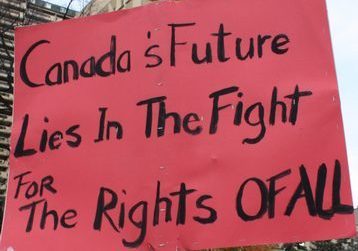
Opining on the appointment of Rechie Valdez as Minister of Small Business, a rookie MP first elected in 2021, the CBC said that until her appointment, the 960,000 members of the Filipino community in Canada have had no representative in Parliament since 2004. It really shows the dilemma facing what is called a representative democracy when even state media admits Canadians have no representation! CBC noted that "by comparison, Canada's 770,000 Sikhs were represented by four out of 40 ministers in Prime Minister Trudeau's first cabinet." Such calculations by cartel parties and the media reflect their own racist outlook and aim to sow racist divisions to undermine the need for the unity of the Canadian people to renew the democracy on a mass democratic basis. By doing so, the sovereign decision-making power is vested in them and the conception of rights inherited since the conquest of Canada by colonizers -- perfected in the Victorian parliamentary reform and morality in the 19th century, then reduced to everyone being allotted the role of "consumer in the 20th century" -- is discarded once and for all.
The Hill Times reported that "Prime Minister Justin Trudeau has 'doubled down' on choosing an overwhelming majority of his front bench from the Liberal 'red wall' consisting of Ontario, Quebec, and the Atlantic provinces that brought him to power in 2015 and provided his two subsequent mandates, according to MPs, political insiders, and pollsters." A Liberal MP who spoke on a "not-for-attribution" basis, told the Hill Times, "I would describe the new cabinet as a battleground cabinet, where you have the new entrants who are either coming from ridings that are battleground ridings, or else they are shoring-up communities that are part of battleground areas."
Not a word is said about the fact that what is portrayed as a significant political event has nothing to do with addressing the problems that the people are facing. There is no mention of how the new cabinet plans to deal with the crisis in health care, the housing crisis and inflation, which is driving workers into poverty and making life literally impossible for families and individuals on fixed incomes, disability pensions and social assistance of various sorts. No mention at all about the war preparations and military spending, or destruction of the social and natural environment.
Instead the mainstream media repeat the vacuous messaging from the Prime Minister's Office (PMO) that the Liberals have done a great job and will do an even better job in the future. The PMO states that:
"Building on the work done since 2015 to invest in Canadians and to strengthen the middle class and those working hard to join it, the team will continue to move forward on housing and putting more money back in families' pockets. To deliver a better future for everyone, the team will also continue to fight climate change and walk the shared path of reconciliation."
No discussion is permitted on the direction of the economy or the need for a foreign policy that serves Canadians and not the demands of the U.S./NATO. Such cynical, self-serving manoeuvres of the party in power to stay in power, using the people and even its own MPs as pawns, are contemptible.
While
these things are true, the questions is what to do? Where do the people
go from there? Dropping out and trying to wash one's hands of all of it
is not an option because the damage done to the country and human
beings and nature is already too much.
For
the list of the new cabinet, click here.
National Security Council
Proving the point of further dangers which lie ahead, on July 26, the intent to form a "National Security Council" was announced in a statement from the Prime Minister's Office. According to the statement this will be "a new forum for ministers to deliberate on and address issues of pressing concern to Canada's domestic and international security." Membership in the council and other changes to existing Cabinet committees, the statement says, will be announced "in the coming weeks."
The announcement brings Canada in line with the rest of the "Five Eyes" -- the U.S.-led network of imperialist intelligence agencies in Australia, Canada, New Zealand and the UK.
The proposal to establish such a committee was made by David Johnston, the former Governor-General who Trudeau nominated as the government's special rapporteur to investigate "foreign interference" in Canadian affairs. This of course does not include U.S. interference which is no longer even considered foreign. The section of Johnston's report on "foreign interference" titled "Issues for Review in the Public Stage of my Work," prepared before he resigned the position, contains the proposal to establish this "National Security Council." The major stated purpose of such a committee is to address the revelations in testimony to Johnston that "intelligence reporting" was falling into "black holes" and not reaching senior civil servants and ministers.
No explanation is provided to explain how a "National Security Council" which would seem to be the prime example of a "black hole," will remedy the problem of "intelligence reporting" falling into "black holes." Its role will be to further deprive the people of information and having any say in the direction of foreign policy by creating yet another exclusive club with access to the "secrets of state" provided by totally unaccountable police who now seem to run the show with heads of state, the arms industry and entire governments and countries at their disposal.
It must not pass!
Ontario Education Negotiations
Ongoing Attempts to
Eliminate the Right to Strike
in K-12 Education in Ontario
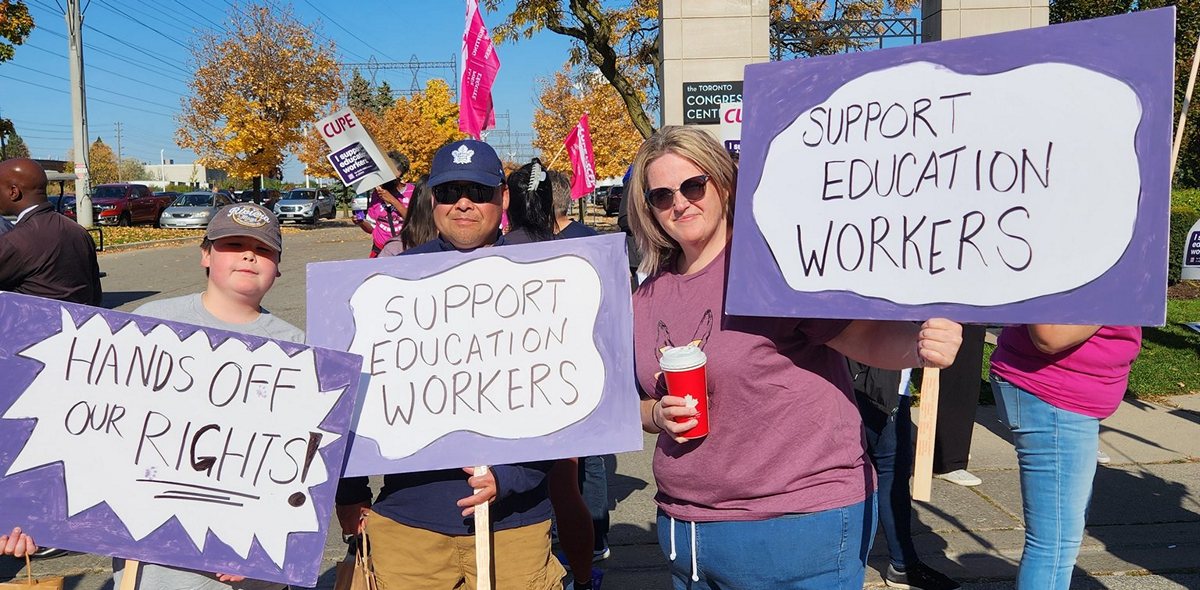
As the school year begins, of immediate importance to workers across the country are the attempts of the Ontario Ford government to pressure education unions to give up their right to strike. Instead, they are to submit to a process of binding interest arbitration in which an arbitrator will decide all matters which cannot be sorted out through what is called good faith negotiations, which no longer exist.
Teachers and education workers in Ontario have been without a contract since August 31, 2022. Only education workers represented by CUPE's Ontario School Board Council of Unions (OSBCU) have been able to come to agreements acceptable to them after a determined fight with the Ford government over their right to strike.
At least one union, the Ontario Secondary School Teachers' Federation (OSSTF), is now taking the prospect of binding interest arbitration to its members for a vote to decide if this is an acceptable way to go. This follows an announcement from OSSTF that it would hold strike votes in September if the government refused to negotiate. Meetings for members to discuss OSSTF's proposal for binding arbitration will be held during the month of September. Meanwhile the other education unions continue negotiations, with the Elementary Teachers' Federation of Ontario (ETFO) applying for conciliation.
Binding interest arbitration as a method of resolving conflict with the government has repercussions. It is being presented as a legitimate method to establish contracts before any strike action has even taken place, and in fact as a replacement for workers exercising their right to strike. Arbitration has been put forward by unions in the past as a way to resolve disputes with governments. BC teachers, for example, did so in 2014 after a prolonged strike in which the workers were able to mobilize public opinion behind their demands.
Some are now claiming that getting a good arbitrator who is generally seen as not anti-union will favour the workers in a situation where the government refuses to negotiate. In this way workers are being encouraged to rely on the existing labour relations regime and an arbitrator who is called neutral, to determine their wages and working conditions. This is happening at a time when to date the government has refused to negotiate, and is making significant changes to educators' working conditions through legislation.
This attempt by the Ford government to prevent strike actions instead of bargaining comes after it tried in vain to impose a contract on 55,000 CUPE OSBCU education workers in November 2022, using the notwithstanding clause of the Canadian Charter of Rights and Freedoms to criminalize the workers' planned strike action. But when the education workers refused to submit and went out on a province-wide protest, earning the support of virtually the entire trade union movement, the Ford government was forced to back down.
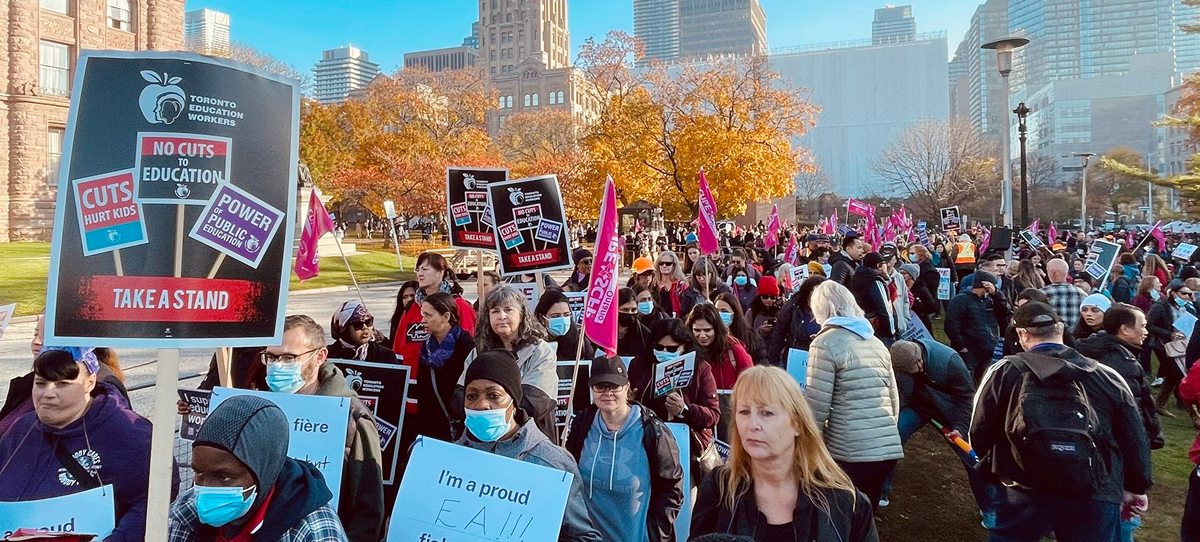
CUPE OSBCU education
workers picket Queens Park during political action day, November 4,
2022, defying Ford government's attempt to impose a contract.
However, it has refused to back down on its dictate that there be no strikes of teachers and education workers and is now insisting on the use of binding interest arbitration as the means to do this.
A situation is being created in which the government is trying to force unions to rely on the state to resolve differences with the government rather than on their own members and other working people who support their just cause. The issue is not pro or con binding interest arbitration, but rather who should decide their conditions of work: the state, or workers through their unions and their own actions. If governments refuse to negotiate, can the state be relied upon to affirm the rights of workers?
The experience of the working class in this period is that such measures are taken in a stepwise manner by neo-liberal governments to eliminate the right of workers to a say over their wages and working conditions. This is especially the case in the provision of provincial and national social programs such as education and health care. This takes place at the same time that billions of dollars are removed from these programs and diverted into self-serving schemes.
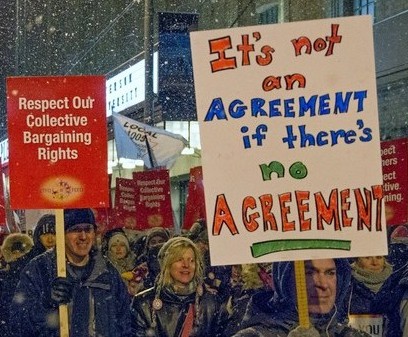 Ever since the
McGuinty Liberal government used Bill 115 in 2012 to try to impose
contracts in K-12 education in Ontario, every successive government has
taken measures to try to limit – and now to eliminate
– the right of teachers and education workers to strike on a
local or provincial level.
Ever since the
McGuinty Liberal government used Bill 115 in 2012 to try to impose
contracts in K-12 education in Ontario, every successive government has
taken measures to try to limit – and now to eliminate
– the right of teachers and education workers to strike on a
local or provincial level.
First, provincial bargaining was imposed as a formal process without negotiation with the unions and school boards, with the promise that local bargaining would be preserved and that only big items such as salary and benefits would be dealt with centrally.
Then the Ontario Labour Relations Board ruled that any matter in negotiations which involved any amount of money was basically removed from local negotiations and made a central matter if both government and provincial union could not agree where it would be dealt with. This meant the government could veto anything going local.
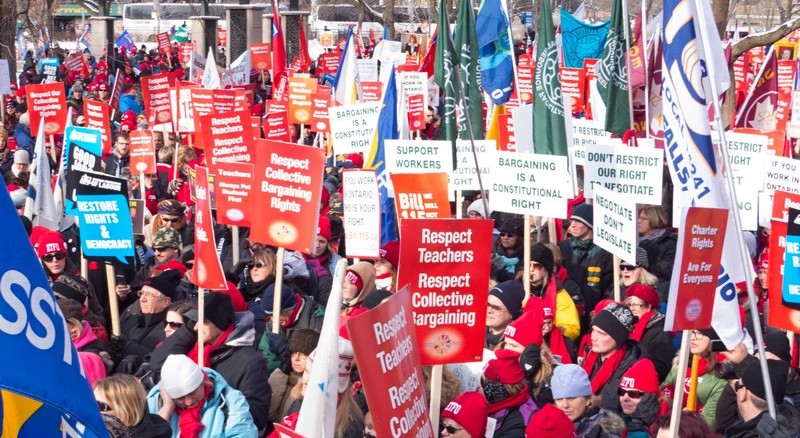
Rally January 26, 2013,
against McGuinty government's attempt to impose contracts on teachers
under Bill 115.
Subsequently, a local strike of high school teachers was outlawed by the Labour Board on the basis that it was "tainted" by central demands and not really a local strike, meaning the strike was made illegal.
Now, the Ford government is hoping to set a precedent that will further eliminate the say of teachers and education workers over their working conditions, which are in fact students' learning conditions, with the pressure to use binding interest arbitration. It is holding out the possibility of an arbitrator awarding significant pay raises to support recruitment and retention of staff, along with a lump sum payment to remedy Bill 124, which capped public sector compensation at one per cent for four years and which has been declared unconstitutional.
Governments across Canada are watching what is taking place to see if they too can use such mechanisms to eliminate the right to strike. The challenge facing teachers and education workers and other workers who face the same demand in Ontario on this Labour Day is to argue out what favours them under the circumstances and how to prevent attempts to divide their ranks – pro or con – from stopping discussion. By openly discussing what to do and what will favour them and education in general, teachers and education workers can find a way forward.
Secondary School
Teachers' Union's Proposal
to Prevent Strike
At a special meeting on August 25, Ontario Secondary School Teachers' Federation (OSSTF) Bargaining Unit Presidents and Chief Negotiators of local districts across Ontario voted in favour of recommending a process for negotiations with the Ontario government which would eliminate the right of the union to strike centrally or locally in this round of negotiations. All outstanding local and central matters that cannot be resolved at the bargaining table by October 27 would be referred to what is called binding interest arbitration. OSSTF members will vote on the proposed process in September to say whether they accept this direction. In a press release the union has made it clear that "the proposal is not a tentative agreement but establishes a clear pathway forward for this round of bargaining."
The union says that the proposal also "guarantees that OSSTF/FEESO Members will receive a remedy for wages lost under Bill 124, the Ford government's wage suppression legislation" that unfairly targeted those working in the women-dominated public sector. "Members will receive the remedy without having to wait for the courts to decide on the constitutionality of Bill 124," the union said. This refers to the fact that the Ford government has appealed the ruling of a lower court which found that Bill 124 did violate the rights of teachers and education workers and public sector workers in general, all of whom are implicated in this decision.
If OSSTF members vote in favour of the process proposed, central bargaining will continue until October 27, and any matters that have not yet been settled by that date will go to binding interest arbitration. This form of arbitration is outlined in the School Boards Collective Bargaining Act (SBCBA) under which central and local bargaining takes place in Ontario. This legislation was also imposed without negotiation by the Ontario Liberal government in 2014. This followed its violation of teachers' and education workers' right to strike in 2012 with Bill 115 in an attempt to remove over a billion dollars in banked sick days from educators. The SBCBA stipulates:
"When resolving matters in dispute with respect to central bargaining, an arbitrator or board of arbitration appointed under section 40 of the Labour Relations Act, 1995 shall take into consideration all factors that the arbitrator or board, as the case may be, considers relevant, including the following criteria:
1. The school boards' ability to pay in light of their fiscal situation.
2. The extent to which services may have to be reduced, in light of the decision or award, if current funding and taxation levels are not increased.
3. The economic situation in Ontario.
4. A comparison, as between the employees and other comparable employees in the public and private sectors, of the terms and conditions of employment and the nature of work performed.
5. The school boards' ability to attract and retain qualified employees.
Various rumours circulating say that the union and the government have agreed on an arbitrator, William Caplan. Caplan was appointed by the Ontario Labour Relations Board as mediator with the Canadian Union of Public Employees (CUPE) Ontario education workers during their last round of central negotiations with the government. Despite this mediation, the Ford government passed Bill 28. This legislation would have imposed a contract and invoked the notwithstanding clause of the Charter of Rights and Freedoms, making it illegal for the workers to take job action in response or even for the Labour Board or courts to review or question the government's action. This was blocked by the mass protests of CUPE and Ontario Public Service Employees' Union education workers and the threat of the same by unions across Canada.
If members vote against the process, bargaining would continue with no arbitrary end date set. It would also mean the union would retain the right to strike in defence of its interests and those of public education, with the government also retaining the right to lock workers out. Nothing would prevent the government and the union also agreeing to binding interest arbitration at a later date before, during or after any strike or lockout. The fact that OSSTF is presenting the proposal to the membership to decide what to do indicates that it is up to the members to deliberate and decide on what will favour them and public education as a whole.
OSSTF President Karen Littlewood stated: "Today represents a critical point in this round of bargaining. Since beginning bargaining 13 months ago, OSSTF/FEESO has been fighting to improve the learning and working conditions in Ontario's schools but the Ford government and school boards have refused to be a fair partner in these negotiations. This process is not a tentative agreement but it does promise to break any impasse by bringing in a third party arbitrator to seek a fair and just resolution."
"As a democratic organization," she said, "it's critical that we allow Members to have the final say through a vote on whether OSSTF/FEESO should enter into this proposal. Bargaining will continue centrally and locally throughout the voting process."
Littlewood added that stability in education would come from teachers and education workers not asserting their rights through strike action. She stated that if the process is approved, "It will also mean that we, as dedicated education professionals, will be able to continue to deliver stability for students in Ontario while seeking the best possible deal for the OSSTF/FEESO membership."
Who Said What
Government of Ontario
Despite the clarity of the OSSTF president's message, following the announcement by the union the Ford government's Minister of Education Stephen Lecce issued a press release titled "Ontario reaches tentative agreement with Ontario Secondary School Teachers' Federation to provide stability in public high schools."
Lecce stated, "I am very pleased to announce that we have reached a tentative four-year agreement with the Ontario Secondary School Teachers' Federation (OSSTF) on a process that, if ratified by the union's members, will keep students in class where they belong. If this agreement is ratified, a student who entered grade nine in an English public high school last September will have their entire high school experience free from the threat of teacher strikes. That's something all of us can celebrate."
Using the agreement with OSSTF as a wedge against other education unions Lecce stated: "To ensure stability across the entire education system, we are inviting all outstanding teacher unions to meet with the government as early as Monday to also enter into a tentative deal ahead of the start of school. Let's get these deals done and let kids get back to learning in peace and with confidence."
Education Unions
The Association des enseignantes et des enseignants franco-ontariens (AEFO), Elementary Teachers' Federation of Ontario (ETFO), and Ontario English Catholic Teachers' Association (OECTA) issued the following statement on August 25 in response to the announcement that OSSTF may be entering into binding arbitration with the Government of Ontario:
"Today's announcement from Minister of Education Stephen Lecce and OSSTF/FEESO, that the parties may be entering into binding arbitration, is not something that AEFO, ETFO, and OECTA can consider at our respective bargaining tables at this time.
"Entering into binding arbitration at this juncture would not support the students we serve in elementary and secondary schools – as binding arbitration would all but guarantee that the key issues we have brought forward at our respective bargaining tables, which are critical to learning and working conditions in our schools, would not be addressed.
"Furthermore, the decision to enter into binding arbitration now impacts the opportunity for meaningful local bargaining on key local issues.
"The Ford Conservative government has continually refused to engage in substantive discussions with our unions, despite our many attempts to make progress at our respective bargaining tables. We once again call on the government to respect our right to free and fair collective bargaining, and come to our bargaining tables prepared to engage in meaningful discussions about critical issues facing publicly funded education in Ontario – issues such as increased violence in schools, resources and supports for student mental health, teachers' use of professional judgement, and addressing the teacher shortage.
"The frontline teachers and education workers represented by AEFO, ETFO, and OECTA will continue to work toward achieving fair, negotiated agreements that defend and protect publicly funded education, and support all students, educators, and families in this province."
On August 29, ETFO filed for conciliation, which means a conciliation officer appointed by the Labour Relations Board would attempt to move negotiations forward with the government. The union stated in a press release, "At this point in time, ETFO does not think [binding interest arbitration] is viable, given some of the issues the Federation would like addressed during bargaining, including: violence in schools, the crisis in the recruitment and retention of educators, the hybrid learning model, the early reading screener, and special education supports for our most vulnerable elementary students."
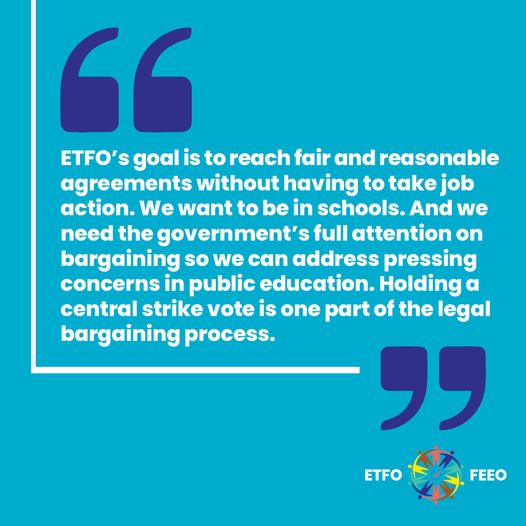 It added that "While ETFO was
initially able to make some significant progress at its Education
Worker Central Table, bargaining at this table has been stalled for
months. ETFO's experience at the Teacher/Occasional Central Table has
been less constructive. No progress has been achieved at this table on
any key issue including salary, supports for special education,
violence in schools, hybrid learning, benefits, or addressing the
crisis of retention and recruitment in the education system. In
addition, the Ontario Public School Boards' Association/government
bargaining team has refused to remove strips they tabled on issues such
as sick leave entitlements, benefits, and professional judgement.
It added that "While ETFO was
initially able to make some significant progress at its Education
Worker Central Table, bargaining at this table has been stalled for
months. ETFO's experience at the Teacher/Occasional Central Table has
been less constructive. No progress has been achieved at this table on
any key issue including salary, supports for special education,
violence in schools, hybrid learning, benefits, or addressing the
crisis of retention and recruitment in the education system. In
addition, the Ontario Public School Boards' Association/government
bargaining team has refused to remove strips they tabled on issues such
as sick leave entitlements, benefits, and professional judgement.
"The Ford government is currently demanding significant cuts to sick leave, benefits, and professional judgement. Binding arbitration would mean that the arbitrator is 100 per cent in control over what happens to those items."
The Federation is holding central strike vote meetings throughout the province from mid-September to mid-October.
Academics
In an article in The Conversation, Larry Savage, Professor of Labour Studies at Brock University, and Stephanie Ross, Associate Professor of Labour Studies at McMaster University wrote:
"Interest arbitration is a mechanism for resolving outstanding bargaining issues. It's most commonly used in instances where essential workers like firefighters or nurses are legally denied the right to strike. Less often, unions and employers use interest arbitration to achieve a first contract or resolve a contentious strike.
"Once the parties negotiate to impasse, a neutral third party – the arbitrator – is called in to settle the outstanding issues. The result is binding on both parties.
"In the case of OSSTF's recent agreement with the province, it had not bargained to impasse, let alone conducted a strike vote to test members' resolve and try to change the employer's position."
The authors added:
"Interest arbitration is seductive for unions given recent decisions that have awarded major wage increases to Ontario nurses and other health care workers to compensate for the effects of Bill 124, which capped public sector wage increases at one per cent per year and has been deemed unconstitutional.
"For workers whose wages have fallen behind over many years, the prospect of catching up without having to build for a potential strike is tantalizing."
"However, there are at least four reasons why prematurely agreeing to binding interest arbitration is highly problematic for unions.
"First, it normalizes the idea that the right to strike is unnecessary. That kind of thinking demobilizes unions and renders members passive. Because the arbitrator's decision is binding, members don't get to vote on the final settlement and therefore become mere bystanders. In short, interest arbitration ignores the key to unions' power – an organized and mobilized membership.
"Second, reliance on interest arbitration can actually increase bargaining impasses by reducing the incentive to negotiate terms that both parties can live with. If a third party is going to decide what the contract says, why budge from one's initial bargaining position?
"Researchers call this the 'narcotic effect' because both unions and management become dependent on interest arbitration to decide contract terms. The problem is that imposed settlements rarely resolve the underlying conflicts.
"Interest arbitration is an inherently conservative process. There is no guarantee that wage increases in one sector will be reproduced in others. Furthermore, arbitration is a poor mechanism for addressing deeper issues like the lack of investment in public services, which underpins the real problems so many public sector workers face."
The article concludes:
"In recent years, unions have won hard-fought battles against governments' attempts to strip away workers' rights to bargain and strike.
"After all this effort, voluntarily giving away these rights and turning over all the power to an arbitrator seems unthinkable. Anti-union governments don't have to worry about restricting the right to strike if unions are simply willing to give up that right in exchange for the crutch of interest arbitration."
Government Forced to
Negotiate New
Standardized Reading Tests
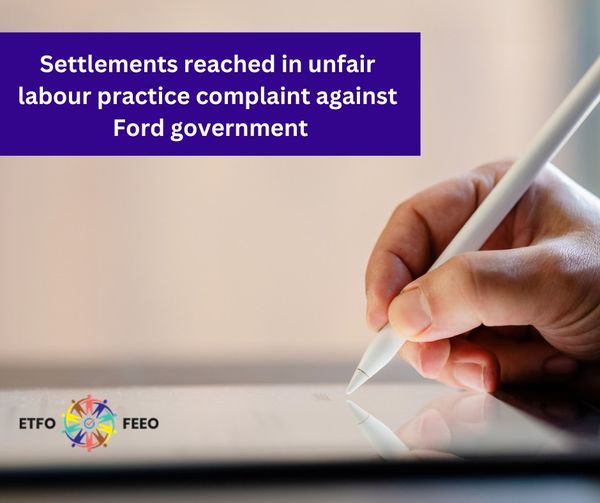 On August 23,
the Elementary Teachers' Federation of Ontario (ETFO) and the Ontario
English Catholic Teachers' Association (OECTA) informed that they had
settled an unfair labour practices complaint with the Ontario Labour
Relations Board. They filed this complaint in response to the
government's unilateral imposition of a new standardized test for
reading called the Early Reading Screening Tool. The new test was
imposed without negotiation with elementary teachers nor any training
or resources to ensure that it could achieve its stated aim of
identifying students with reading difficulties – many as a
result of the pandemic.
On August 23,
the Elementary Teachers' Federation of Ontario (ETFO) and the Ontario
English Catholic Teachers' Association (OECTA) informed that they had
settled an unfair labour practices complaint with the Ontario Labour
Relations Board. They filed this complaint in response to the
government's unilateral imposition of a new standardized test for
reading called the Early Reading Screening Tool. The new test was
imposed without negotiation with elementary teachers nor any training
or resources to ensure that it could achieve its stated aim of
identifying students with reading difficulties – many as a
result of the pandemic.
In addition, the test was not backed up with the investment of resources to ensure that students identified early would receive the support they require. The test violated elementary educators' professional judgement because it was imposed without their involvement or expertise. What tests can and cannot be used, and how they are used, was also the subject of negotiations at the bargaining table. The government clearly does not take these seriously as it wants all matters settled outside of negotiations – either through its own dictate or that of the Labour Board through arbitration.
The week that the complaint was to be heard, the government offered to settle. They made it clear that teachers should use their professional judgement to determine the best ways to identify and support students who are struggling to read, something teachers already do, however with less and less support.
In a press release, the unions stated:
"On August 22, ETFO and OECTA reached settlements with the government. In those settlements, the government confirms that the use of the Early Reading Screening Tool by teachers is no longer mandatory for the 2023-24 school year – educators will continue to use their expertise to identify and address students' unique individual needs. The government also commits to returning to the bargaining table to resolve the issue in good faith. The government will be issuing a memorandum to school boards to advise of the change in direction."
"We call on the Ford Conservative government to learn from this error in judgement and bargain in good faith. Our message to the government is clear: keep bargaining issues at the bargaining table or we will continue to take swift action to protect our members' bargaining rights and public education. Both of our associations will continue to work toward realizing a fair, negotiated agreement that supports all students, educators, and families," the press release concluded.
Interview with Leaders of the Marxist-Leninist Party of Quebec
On Democracy and the Constitution
The following interview with Christine Dandenault, Leader of the Marxist-Leninist Party of Quebec (PMLQ), and Geneviève Royer, director, were conducted by the Alliance for a Quebec Citizens' Assembly (ACCQ).
Alliance for a Quebec Citizens' Assembly: What is your definition of democracy?
Answer: First of all, I'd like to thank the ACCQ for this initiative of doing interviews on democracy and the constitution, and for the work you're doing. Creating the space for discussion, gathering points of view and bringing this discussion into the public arena is very valuable.
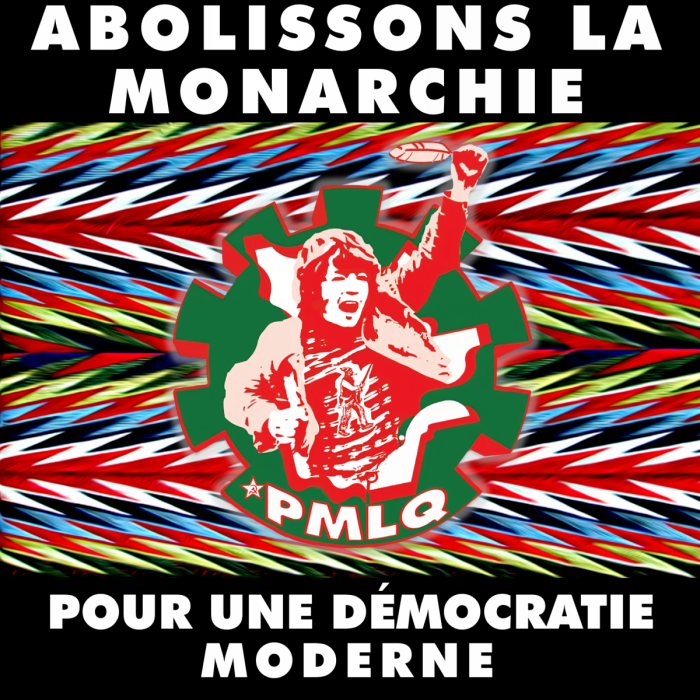 For our party,
establishing a modern democracy means abolishing the monarchy. A modern
democracy is one that vests the people themselves, and not the
representatives of the rich, with the sovereign power to govern and
decide on all matters that concern them, including the direction of the
economy.
For our party,
establishing a modern democracy means abolishing the monarchy. A modern
democracy is one that vests the people themselves, and not the
representatives of the rich, with the sovereign power to govern and
decide on all matters that concern them, including the direction of the
economy.
Democracy today is in crisis, and the constitution is totally outdated. This was clearly exposed with the death of Queen Elizabeth II, and even more so with the coronation of Charles III. No one could turn a blind eye to the fact that Canada is a constitutional monarchy, that Trudeau applauded the new monarch, his sovereign, and that it's not just a symbol!
It is "the people" who must define "the people", not the state, established by the British Empire of old, perpetuated by those who benefit from the structures of power and privilege it established.
Last fall, the Parti Québécois' refusal to pledge allegiance to the British monarchy was widely supported by the population. It was a step forward. This British monarchy is not only an archaic, outdated and retrograde relic of another era, it is also the concrete expression of the fact that the sovereignty of the Quebec nation, the First Nations and the Canadian people is denied by the British North America Act (BNAA).
ACCQ: In your opinion, what are the causes of the population's loss of confidence in political institutions?
Answer: The main cause is people's experience that all the parties in the National Assembly are defending the same arrangements that exclude them from power. Even if the parties have differences here and there in their respective programs, they are unanimous in refusing to renew the decision-making process so that it is in the hands of the people.
Every day, we hear these parties claim to represent the people of Quebec, while their views and demands for change are totally absent.
Just think of what the right to vote represents today. It doesn't mean much anymore, because it gives no power over decision-making. It doesn't change the direction of the economy. It doesn't change the way governments implement the neo-liberal, anti-social agenda of paying the rich. It only allows us to vote once every 4 years to hand over to others the power to decide, in our name, for a program that attacks individuals and collectives and serves a small minority. So, of course, there's a loss of confidence.
ACCQ: In discussions about a new constitution, a question often comes up about the accountability of elected politicians in relation to their electoral commitments. Where do you stand?
Answer: This year is the 32nd anniversary of the last official reports on the general political disaffection and dissatisfaction of Canadians with the disempowering electoral process. The Spicer Commission on Canada's Future presented its findings to the Mulroney Conservative cabinet in June 1991. The Royal Commission on Electoral Reform and Party Financing followed, presenting its report and recommendations in November 1991. Both commissions reported on citizens' dissatisfaction with politicians, political parties and Parliament. Citizens called for an end to the concentration of decision-making power in the hands of a few. Many people submitted proposals to the commissions for a constituent assembly that would allow the people to draft and approve their own constitution and electoral law.
 More recently in
Quebec, the loss of voter confidence in institutions was raised
following the revelations of the Gomery Commission on the sponsorship
scandal in 2004, among others, during the revelations of the
Charbonneau Commission in 2015. Since then, legislation has been passed
on political financing, among other things. They have not given
democratic institutions any credibility. Quite the contrary, in fact.
The more the proposed changes tighten the state's grip on political
parties, the more they become appendages of the state, undermining the
right of association, the right to conscience, the right to an informed
vote, the right to elect and be elected and the right to participate in
citizen governance.
More recently in
Quebec, the loss of voter confidence in institutions was raised
following the revelations of the Gomery Commission on the sponsorship
scandal in 2004, among others, during the revelations of the
Charbonneau Commission in 2015. Since then, legislation has been passed
on political financing, among other things. They have not given
democratic institutions any credibility. Quite the contrary, in fact.
The more the proposed changes tighten the state's grip on political
parties, the more they become appendages of the state, undermining the
right of association, the right to conscience, the right to an informed
vote, the right to elect and be elected and the right to participate in
citizen governance.
So we say that this process must be modernized so that it is the citizens who choose the candidates, who themselves define the government's program on the basis of defending the rights of all, and so that the financing of political life is assured by public funds – financing the process, not the parties, etc.
ACCQ: Do you recognize the influence of lobbies on politicians?
Answer: Lobbies and the policies that surround them are an admission that the direction of the economy is in the hands of large private interests. This is corruption at its core, and in the name of transparency, the laws and regulations governing lobbying simply make this corruption legal.
Today, we are witnessing supranational bodies deciding what policies governments should follow in order to pay the rich. This means the privatization of politics. It's the direct takeover of government and state functions by narrow private interests.
In practice, the governments of Canada and the provinces, including Quebec, are integrating the country's resources into the U.S. war machine and its economy. For example, NATO dictates an increase to Canada's military spending. Meanwhile, Canada creates anti-China hysteria about alleged Chinese espionage and interference, but has no problem with the domination of Canada by the U.S. war economy, against the people's interests. This shows that there are great contradictions within these bodies, and it's very dangerous for the people of Quebec and Canada.
ACCQ: What do you think of the influence of supra-governmental networks (UN, WHO, UNESCO, etc.) on our policies?
Answer: The UN was founded in San Francisco on October 24, 1945 to prevent another conflict like the Second World War. When it was founded, it had 51 member states; it now has 193. Today, the UN needs major reforms if it is to fulfill its peace mandate. Instead, the Security Council is subject to intimidation and blackmail by the major powers, and fails to defend the rights of the world's countries and peoples, large and small. This is why it must be reformed to realize the principles of its Charter, which oppose aggression and interference in the affairs of member states, and affirm the rights of all nations.
ACCQ: What are your proposals for reducing the impact of lobbies?
Answer: We'll put an end to corruption by taking steps to affirm, not deny, freedom of association, the right to conscience, the right to an informed vote, the right to elect and be elected, the right to participate directly in governance.
ACCQ: Could randomly selected citizens' committees help to reduce conflicts of interest on the part of those in power?
Answer: On the face of it, any new political process is positive in the sense of giving people a new experience in exercising democracy. Your concern to form citizens' committees is interesting because we need to find new ways of doing things today, new forms that will change the situation. We need reforms that will empower the body politic to participate in political life. The political system is organized to keep citizens on the margins of decision-making, as spectators and voting cattle. The marginalization of voters, the body politic and their concerns in elections and in everyday life is a crucial problem to be solved.
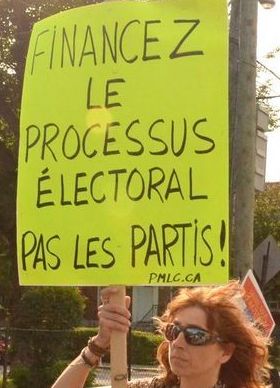 One of the
measures to be taken is for the state to fund the electoral process 100
per cent, not the parties. Today's reality is that the state finances
political parties to the tune of 90 per cent with public funds. The
pretext is given that this is to combat corruption and provide
transparency. But in fact, it's a corrupt mechanism, because political
parties are private entities that should be financed by their members,
not the state.
One of the
measures to be taken is for the state to fund the electoral process 100
per cent, not the parties. Today's reality is that the state finances
political parties to the tune of 90 per cent with public funds. The
pretext is given that this is to combat corruption and provide
transparency. But in fact, it's a corrupt mechanism, because political
parties are private entities that should be financed by their members,
not the state.
Public funds should be used to encourage the electorate to participate in politics, to provide them with the names of all the candidates and their programs, and all kinds of other initiatives so that people can decide for themselves.
ACCQ: How much of a problem is polarization in our society?
Answer: Division is the very basis of the BNAA, which is called the Constitution of Canada: divisions between founding peoples and Aboriginals, between Quebec and the rest of Canada, between workers and newcomers, etc. These divisions are designed, among other things, to stifle public opinion, which considers that everyone has equal rights and that this must be reflected in Canada's Constitution.
It serves to keep the people out of power, whereas today the solution lies in creating new forms and content that empower the people to govern and decide. Society, with its many human relationships, is the basis of the state, not the other way round. The constitution does not define democracy, nor does the state apparatus it puts in place. On the contrary, society and its relationships do. Changing these power relationships is an integral part of achieving change that benefits the people.
Quebeckers need to be able to develop modern, human-centred social relationships with each other and with humanity as a whole.
ACCQ: What issues do you think could be removed from partisanship?
Answer: The Larousse Dictionary gives the following definition of partisanship: "In Quebec, the attitude of a person who shows an exclusive attachment to a political party and a biased point of view in its favour."
Being partisan does not necessarily mean partisanship for a political party. Being partisan means defending causes that seem important to us. For example, we've just been through a period of the pandemic when governments in particular proceeded by ministerial decrees in the health field. This had a huge impact on the resignation of thousands of nurses. When elections came around, the only way they could make their claims heard was to join a political party or candidate. They were told: you have to set yourself up as a third party, obtain authorization from Elections Québec with a lot of limitations.
An election should be an opportunity for everyone to participate in the discussion based on people's claims. Elections don't allow this. Only the parties have the upper hand. In our opinion, we need to encourage greater citizen participation and, even within the Election Act, find every opportunity for people to speak for themselves, in their own name. This will help democracy.
ACCQ: How can government transparency be improved?
Answer: Transparency is a fraud if it is not associated with accountability to the public or to the collectives affected by the decisions made.
Today, the more governments talk about transparency, the more we should be wary of it, because it means that the more decisions are made behind closed doors.
In the name of transparency, Elections Québec demands the names of party contributors and all information about them, to determine whether it was really they who gave the money or someone else. Freedom of association, which is a matter of individual conscience, has become a matter controlled by the state.
In the name of transparency, during its first mandate, the Legault government boasted of publishing its daily agenda and those of its ministers. It makes no difference where and when ministers are if we have no control over the deals they make with private interests or the decisions they take with impunity!
ACCQ: In what way are political parties more competent than the people to organize their destiny?
Answer: Popular wisdom says the opposite! The people have contempt for the big parties that speak on their behalf for a different agenda. The old politics of promises and privileges are not popular at all!
At election time, for example, state-funded political parties, PR and marketing firms, neo-liberal think tanks and the biggest monopolies and cartels control the choice of candidates and decide which issues should dominate the election and the mass media. In the electoral process itself and the mass media, the body politic and its collectives play no role in deciding what the official issues are and what an elected government must do to fulfill its social responsibilities to the people and society, and be held to account if it fails to do so.
A political party, like any institution, must respond to the demands of the 21st century, where the people must exercise sovereignty in everything. Because it organizes workers and the people to exercise power, and dedicates its resources to this purpose, the population will recognize its usefulness and relevance. This is our opinion.
 Our party has been in existence
for 34 years. We do not consider ourselves more competent than the
people. We're an organized force whose job is to play our part in the
battle for the working class to become the nation and vest the people
with sovereign power. It's up to workers and young people to find a
path for Quebec and Canada, to find out where their future lies in the
world of today and tomorrow, and our Party is dedicated to playing its
part in that direction.
Our party has been in existence
for 34 years. We do not consider ourselves more competent than the
people. We're an organized force whose job is to play our part in the
battle for the working class to become the nation and vest the people
with sovereign power. It's up to workers and young people to find a
path for Quebec and Canada, to find out where their future lies in the
world of today and tomorrow, and our Party is dedicated to playing its
part in that direction.
ACCQ: What solutions do you propose for fair and democratic governance?
Answer: First of all, the electoral process must be changed so that people wishing to run for office are selected by their peers, wherever they run. Political parties could put forward candidates, but it would be the electors of a riding, at an electoral meeting, who would choose the candidates whose names would appear on the ballot. The resources of the Directeur général des élections au Québec should be used, for example, to organize these meetings and publicize the candidates and the program they intend to defend.
So, for our part, we're organizing meetings and discussions to find out how things stand as the anti-social offensive continues to impose an enormous burden on people and society. This is one of the most important organizing fronts in the period ahead.
Your work in bringing the discussion on democracy and the constitution into the public arena is very relevant to informing everyone, to finding solutions in this sense.
ACCQ: What is your opinion on a non-partisan citizens' constituent assembly?
Answer: The PMLQ pays particular attention to the need to abandon the current constitutional order and elect a Constituent Assembly on a democratic basis that creates a structure where all citizens are equal and that can entrust sovereignty to the people on a modern basis.
This is an opportunity to recognize the need for a democratically-based Constituent Assembly to draft a modern constitution to replace the one used to found Canada under the conditions of 1867 and its so-called modernization in 1982. The incorporation of a Charter of Rights and Freedoms in 1982 was simply a reminder that a power superior to the people defines the limits to which rights are subject. These limits benefit narrow private interests and keep the people powerless to act.
Yes, and the Constituent Assembly must be tasked with drafting a modern constitution that recognizes the rights and duties of all and eliminates all traces of the monarchy. This also includes making Quebec a zone of peace, and supporting those who fight for the rights of all.
(To access articles individually click on the black headline.)
Website: www.cpcml.ca Email: editor@cpcml.ca

